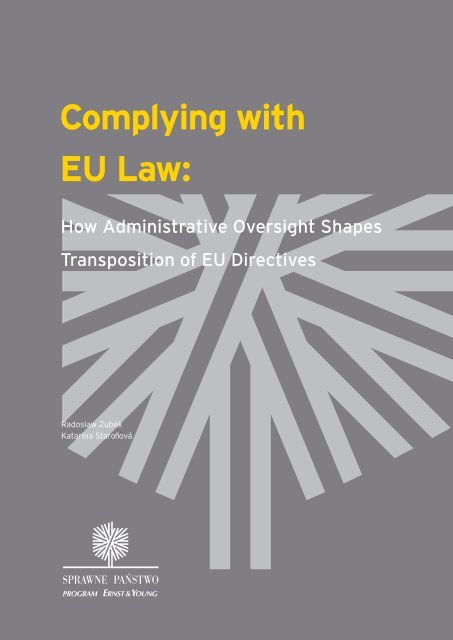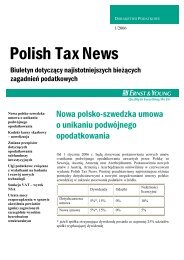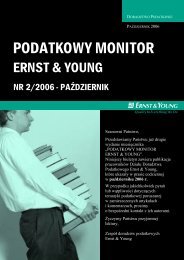Complying with EU Law: - Ernst & Young
Complying with EU Law: - Ernst & Young
Complying with EU Law: - Ernst & Young
You also want an ePaper? Increase the reach of your titles
YUMPU automatically turns print PDFs into web optimized ePapers that Google loves.
<strong>Complying</strong> <strong>with</strong><strong>EU</strong> <strong>Law</strong>:How Administrative Oversight ShapesTransposition of <strong>EU</strong> DirectivesRadosław ZubekKatarína Staro ováWarsaw 2010
Graphic designer:KotburyReport developed under the Better Government Programme for <strong>Ernst</strong> & <strong>Young</strong> Polskaspółka z ograniczoną odpowiedzialnością sp. k.Legal disclaimerThis report has been prepared by academics to provide readers <strong>with</strong> general informationon topics they may find to be of interest.The information contained in this report shall in no case constitute the provision of services.Whilst the authors have made every effort to ensure that the information presented in thisreport is accurate, there is always the risk of inaccuracies. <strong>Ernst</strong> & <strong>Young</strong> Polska spółkaz ograniczoną odpowiedzialnością sp. k. ”EY” shall not accept any liability for, and givesno warranty as to, the accuracy and completeness of the information contained in thisreport. The report may contain references to specific statutes or regulations that aresubject to amendment and should, therefore, be interpreted solely in the specific contextin which they are quoted. The information is published <strong>with</strong>out regard to any changes, andEY gives no warranties (express or implied), and makes no representations as to its completeness,accuracy and validity.Furthermore, in so far as it is legally entitled to do so, EY disclaims all warranties (expressor implied), including, <strong>with</strong>out limitation, any implied warranties of the merchantabilityand fitness for a particular purpose. EY, its related companies or partners, agents oremployees of EY or its related companies, shall not be held liable to the reader or anythird parties for any decision or action based on the information contained in this report,nor for any indirect, special or consequential losses or damages, even if information ontheir likely occurrence is obtained.© Copyright by <strong>Ernst</strong> & <strong>Young</strong> Polska Sp. z o.o. sp. k., PolandUnless otherwise provided, <strong>Ernst</strong> & <strong>Young</strong> Polska Sp. z o.o. sp. k. holds copyright to thereport. All rights reserved. No part of this report, including the text or graphics, may bereproduced or transmitted in any form or by any means <strong>with</strong>out the written permission of EY.Better Government Programme<strong>Ernst</strong> & <strong>Young</strong> PolandRondo ONZ 100-124 Warsawtel. +48(22) 557 70 00fax +48(22) 557 70 01www.bettergovernment.pl
ContentsAcknowledgments . . . . . . . . . . . . . . . . . . . . . . . . . . . . . . . . . . . . . . . . . . . . . . . . . . . . . . . . . . . . . . 6Executive summary . . . . . . . . . . . . . . . . . . . . . . . . . . . . . . . . . . . . . . . . . . . . . . . . . . . . . . . . . . . . . 7Section 1. Transposition Performance in East Central Europe . . . . . . . . . . . . . . . . . . . . . . . . . . . 8Section 2. Core Executive Oversight and National Performance . . . . . . . . . . . . . . . . . . . . . . . . . 12Section 3. Departmental Oversight and <strong>EU</strong> <strong>Law</strong> Transposition . . . . . . . . . . . . . . . . . . . . . . . . . . 17Section 4. Conclusion . . . . . . . . . . . . . . . . . . . . . . . . . . . . . . . . . . . . . . . . . . . . . . . . . . . . . . . . . . 25Endnotes . . . . . . . . . . . . . . . . . . . . . . . . . . . . . . . . . . . . . . . . . . . . . . . . . . . . . . . . . . . . . . . . . . 27References . . . . . . . . . . . . . . . . . . . . . . . . . . . . . . . . . . . . . . . . . . . . . . . . . . . . . . . . . . . . . . . . . . 285
AcknowledgmentsThe financial support of the <strong>Ernst</strong> & <strong>Young</strong>Better Government programme for thisresearch is gratefully acknowledged.The authors owe a special debt of gratitude toDr Agnieszka Cielen who provided invaluableresearch support in Poland. Thanks are also dueto Krisztina Jáger, Ildiko Bartha, Leno Saarnit,Irena Baclija for research assistance and tonational officials in Estonia, Hungary, Polandand Slovenia who agreed to be interviewedfor this research. The authors remain solelyresponsible for any errors in the paper.
Executive SummaryEach year <strong>EU</strong> member states must pass manydomestic legal acts to transpose newly adopted<strong>EU</strong> directives. The extent to which they do sotimely and correctly affects the functioningof the European single market. Yet, memberstates vary in how they discharge theirtransposition obligations. Some governmentstranspose well, others are persistenttransposition laggards.What affects national transpositionperformance? How can it be improved? Thereis a rich literature seeking to explain crosscountryvariation in <strong>EU</strong> compliance. It showsthat timely and correct transposition dependson, among others, the degree of institutionaland policy fit, political preferences of domesticdecision-makers and the administrativecapacities of national governments.This report focuses on the role ofadministrative oversight understood asmechanisms for coordinating and monitoringthe action of ministries and line sections.The key argument is that whenevertransposition tasks are delegated – from cabinetto ministers and from ministers to civil servants– the risk of deliberate or non-deliberateshirking arises. Such agency losses can bemitigated by oversight mechanisms.The analysis reviews central oversightmechanisms in five new <strong>EU</strong> member statesin the period 2005-2008: the Czech Republic,Estonia, Hungary, Poland and Slovenia.It revels many similarities, but also a few majordifferences in institutional design. Centraloversight is found to be the strongestin Slovenia and Hungary and the least robustin the Czech Republic. Poland and Estonia havemedium strength of central oversight.and Slovenia. It shows that, on average, Polishministries have a slightly weaker oversight overtransposition processes than ministriesin Hungary and Slovenia.The effect of central and departmentaloversight is illustrated <strong>with</strong> quantitative dataon transposition performance at national andministerial levels in east central Europe. Theseresults tend to support the key argument ofthis report: better central and departmentaloversight tends to have a positive impact on theprocess of transposition at the domestic level.The report formulates a few recommendationsfor the Polish government. It argues thatthe present configuration of central anddepartmental oversight could be improvedin particular by:− introducing the practice of regular reportingon transposition performance at cabinet andministerial levels;− integrating and streamlining internal systemsfor planning transposition and domesticlegislation;− reinforcing the management capacitiesof legal departments in coordinating <strong>EU</strong>transposition at the ministerial level.The report also examines departmentaloversight in 20 ministries in Hungary, Poland7
Section 1Transposition Performance in East Central EuropeIt has also been found that the degree of‘policy fit’ between <strong>EU</strong>-level rules and nationallegislation has a strong impact on thetimeliness and correctness of transposition. Forexample, Mastenbroek (2003), Thomson et al.(2007), Thomson (2007) and Steunenbergand Toshkov (2009) demonstrate that themore <strong>EU</strong> and national rules diverge, the moreproblematic the transposition process.Political preferencesBesides institutional and policy characteristics,research shows that the preferences of politicalactors shape the patterns of compliance.These findings fall into three categories. First,some studies argue that it matters whethergovernments have a high or low support forEuropean integration. For example, in his studyof new member states, Toshkov (2008) showsthat more <strong>EU</strong> enthusiastic governments tendto be better at transposition. Second, thereis much evidence that high political conflictregarding the transposition issue hasa debilitating effect on transpositionperformance (König and Leutgert 2008).Finally, it has been shown that higherideological differences at <strong>EU</strong> level reduce thelikelihood of transposition, while unanimityin adoption of <strong>EU</strong> rules increases the likelihoodof timely transposition (König and Luetgert2008).Administrative capacitiesMany <strong>EU</strong> implementation studies haveshown that the effectiveness of nationaladministrations critically determines theextent to which member states comply <strong>with</strong>European Union laws (see Mbaye 2001;Kaeding 2006; Hille and Knill 2006; Haverlandand Romeijn 2007; Toshkov 2007, 2008;Zubek 2005, 2008; Kałużynska et al. 2009;Steunenberg and Toshkov 2009). This is animportant finding which provides support forthe ‘management school’ in <strong>EU</strong> complianceresearch (Tallberg 2002). According to thisapproach, member states fail to implement <strong>EU</strong>laws not as matter of preference but because oftheir limited capacities to achieve compliance.In a path-breaking analysis of the <strong>EU</strong>implementation, Siedentopf and Ziller (1988)argue that the quality of governmentalcoordination is a key determinant of successfultransposition. Richardson (1996) linkstransposition performance to administrativestyles prevalent in the national polity.More recently, many quantitative studieshave found that the efficiency of nationalbureaucracies has a strong impact ontransposition performance. Mbay (2001)shows that the structure of the civil service hasa strong effect on the number of infringementsinitiated against a member state (see alsoHaverland and Romeijn 2007). Falkner et. al(2005, 2008) find that the level of availableadministrative resources affects the success oftransposition. Many scholars also show that thegeneral measures of bureaucratic strength aresignificant predictors of transposition records(cf. Berglund et al. 2006; Hille and Knill 2006;Toshkov 2007, 2008).Most of the recent studies resort to statisticalanalyses using aggregate indicators ofbureaucratic efficiency. Relatively fewstudies link specific administrative factors totransposition performance. There are, however,some exceptions. Jensen (2007) shows howthe type of oversight that central governmentuse to monitor compliance by administrativeagencies influences how quickly memberstates resolve infringement proceedings. Morespecifically, he argues that ‘police-patrol’oversight is more effective than ‘fire-alarm’mechanisms.Zubek (2005, 2008) demonstrates how thestrength of core executive oversight overministerial departments affects the extentto which the latter comply <strong>with</strong> transpositioncommitments. His argument is that highercentralization of authority inside nationalcabinets facilitates timely adaptation to <strong>EU</strong>
Section 2Central Oversight and TranspositionPerformanceWhen the <strong>EU</strong> institutions have adopted a newdirective, its transposition into domestic lawis delegated to national ministries. But anydelegation of authority creates the risk thatthose charged <strong>with</strong> delegated tasks (agents)either will not perform or will do so in a waycontrary to the interests of the delegatingactors (principals) (Pratt and Zeckhauser1985; Kiewiet and McCubbins 1991). Such‘shirking’ can be deliberate – when agentshave private interests that diverge fromthose of their principal. It can also be nondeliberate– when agents lack the necessaryresources or fail to perform due to problemsof communication or occurrence of randomevents.In the area of <strong>EU</strong> transposition, the ministerialagents responsible for transposition may betempted to use their gate-keeping powersto delay or block adaptational measuresif <strong>EU</strong> policies bring high costs to sectoralconstituencies or bring benefits that are beyondthe time horizon of ministers and officials. Theymay also lack the necessary time and personnelto effectively carry out <strong>EU</strong>-related legalimplementation tasks. As a result, completeand correct transposition of <strong>EU</strong> directives maybe blocked or delayed at a ministry level. Suchsituations may lead to the problem of noncompliance.Such agency losses can be mitigated byoversight. The literature identifies fourmain types of mechanisms: contract design,screening and selection, monitoring andreporting, institutional checks (Kiewiet andMcCubbins 1991: 27-34). The first two makeit possible to safeguard against agency lossesbefore delegation (ex ante mechanisms),while the other two after delegation (ex-postmechanisms). Oversight may also be reinforcedthrough the presence of an enforcer orsupervisor – a special type of agent whose roleis to monitor and report on the actions of otheragents (Alchian and Demsetz 1972; Tallberg2003).In cabinet settings, the risk of agency lossesat ministerial level is typically addressedthrough the development or reinforcementof a core executive (cf. Dunleavy and Rhodes1990; Andeweg 2000; see also Hallerberg2004). The core executive is normallytaken to comprise of the prime minister,finance minister, non-sectoral ministersand ‘a web of institutions, networks, andpractices surrounding the prime minister,cabinet, cabinet committees and their officialcounterparts’ (Rhodes 1995: 12). The primarytask of the core executive is to identify thecollective interest of the government asa whole and mobilize ministries behind suchgoals. To be effective, core executive actorsare furnished <strong>with</strong> authority and resources thatthey can use to monitor and reward or sanctionthe behaviour of ministers and officials.Research on the national coordination of<strong>EU</strong> transposition indeed demonstrates thatmany national governments establish internaloversight mechanisms to control the way in
Section 2Central Oversight and Transposition Performancewhich directorates and other units dischargetransposition tasks (cf. Kaeding 2007;Dimitrakopoulos 2008; Zubek 2008; Zubek2010 forthcoming).Core Executive OversightTo map the strength of core executiveoversight, this report examines rules governingthe process of transposition in three principaldimensions: transposition planning, substantivereview and monitoring of deadlines (Zubek2010 forthcoming). The focus is, in particular,on the role of cabinet-wide core executiveactors such as Prime Minister’s Offices, StateChancelleries, <strong>EU</strong> secretariats, and ministriesof foreign affairs and justice.In transposition planning, the analysis checksif there exists a monitor <strong>with</strong> responsibilityfor transposition planning across thegovernment. This may be a minister for <strong>EU</strong>affairs, a dedicated <strong>EU</strong> secretariat or a specialcommittee. The monitor may be furnished <strong>with</strong>a variety of powers such as the right to managethe transposition planning process acrossthe government and coordinate <strong>with</strong> parallelprogramming exercises.With regard to substantive review, the keyissue is whether there is a central monitorwho checks the correctness and completenessof transposing measures prepared at theministerial level. The role may be performedby legal services at the <strong>EU</strong> secretariat or thePrime Minister’s Office. The monitor may alsohave the right to draft horizontal, cross-cuttinglegislation.Finally, it is important whether central unitsexist <strong>with</strong> responsibility for monitoringcompliance <strong>with</strong> transposition deadlines. Suchunits may have the right to verify progressin transposition at the departmental leveland report to the prime minister and the fullcabinet.Core Executive Oversight in New <strong>EU</strong>Member StatesThis section presents information on thestrength of core executive oversight in five new<strong>EU</strong> member states (see Table 1 for a summaryassessment). It focuses on the period 2005-2008.The Czech RepublicIn the Czech Republic, transposition wascoordinated in 2005-2008 by the deputy primeminister for legislation and the <strong>EU</strong> compatibilityunit in the Government Office. When a new<strong>EU</strong> measure had been published, the unitallocated responsibility for transposition ofspecific directives among ministries, butits role stopped there. Ministries developedtransposition work plans <strong>with</strong>out any input fromthe unit and uploaded them to the central ISAPdatabase. The <strong>EU</strong> compatibility unit checked iflegislative programmes included all necessarytransposition measures, but its comments hadlow statusAs regards legal review, the <strong>EU</strong> compatibilityunit reviewed all draft legislation forcompatibility <strong>with</strong> the <strong>EU</strong> law and checkedif transposition was complete and correct.Progress was discussed at monthly meetingsof administrative coordinators at theGovernment Office, but these meetings werelargely technical and focused on verifying theinformation contained in the ISAP database.The <strong>EU</strong> compatibility unit prepared quarterlyreports to the cabinet on transpositionprogress. No regular reminders of delays orother problems were sent, the key emphasiswas placed on the quarterly reports to thecabinet.EstoniaIn 2005-2008, transposition was coordinatedby the <strong>EU</strong> secretariat in the State Chancellery.The <strong>EU</strong> secretariat was responsible forcollecting the information about all newly13
Section 2Central Oversight and Transposition Performancepublished directives. It prepared a summary ofall new measures and proposed allocation ofresponsibilities. The document was discussedand accepted – every two weeks – by the <strong>EU</strong>coordination committee. Once the collectiveagreement was reached, the <strong>EU</strong> departmentplaced all new measure in a centralizedlegislative system called SEIRA requestingministries to upload transposition plans.The ministries decided on the intermediatedeadlines, but the <strong>EU</strong> secretariat had the rightto challenge ministerial proposals.The <strong>EU</strong> secretariat did not undertakecomprehensive reviews of the correctnessand completeness of transposition. This wasconsidered to be <strong>with</strong>in the competence ofthe line departments. It did, however, receivedrafts for comments and checked them ingeneral terms. The unit did not draft horizontallegislation and did not provide specialassistance to ministries <strong>with</strong> transpositionmatters.The <strong>EU</strong> secretariat used the SEIRA databaseto monitor the progress of transposition.It prepared a monthly report to the <strong>EU</strong>coordination committee on transpositionprogress and a quarterly report to the meetingof secretary generals. It also prepareda bimonthly report to the full cabinet ontransposition progress. The <strong>EU</strong> department alsosent ad hoc reminders to individual ministriesabout major delays and it also used the <strong>EU</strong>coordination committee meetings for thispurpose.HungaryIn Hungary, central coordination oftransposition in 2005-2008 was provided bythe justice ministry. The ministry monitoredthe <strong>EU</strong>’s Official Journal and prepareda weekly newsletter listing all new measuresand ministers responsible. Ministries hadthe primary responsibility for programmingtransposition, but they had to agree theirdetailed transposition work plan <strong>with</strong> theFinance Ministry and the Justice Ministry.The plans were then logged into a centralizeddatabase maintained by the Justice Ministry.The Justice Ministry acted as a watchdog<strong>with</strong> regard to semi-annual cabinet workprogrammes. It always checked if alltransposition obligations were included and,if gaps were revealed, they requested theministries to add missing instruments. Theministry took the lead on drafting horizontallegislation and carried out a verification ofwhether draft legislation correctly and fullytranspose the required <strong>EU</strong> measures.The Justice Ministry used the centraltransposition database to monitor thetransposition record of other ministers andgenerated reports on delayed measures.In 2005-2007, reporting was mainly toa cabinet-level committee and focused mainlyinfringement cases. If serious problems wereidentified, the committee referred issues fora decision to the meeting of the statesecretaries at the PMO or the cabinet.In 2007-2008, there was a new practice ofregular – quarterly – reporting to the fullcabinet on transposition progress.PolandIn Poland, the coordination of transpositionprocess across ministerial departmentswas – until 2009 – the responsibility ofthe Office of the European IntegrationCommittee (UKIE). In January 2010 theUKIE was merged <strong>with</strong> the Foreign AffairsMinistry, but the overall structure of centraltransposition coordination remained moreor less unchanged.In 2005-2008, the UKIE monitored the <strong>EU</strong>’sOfficial Journal and informed ministries –on a more or less regular basis – of newlyadopted <strong>EU</strong> measures. The responsibilityfor the actual programming of transpositionwas <strong>with</strong> the individual ministries. They hadto prepare detailed work plans which were
Section 2Central Oversight and Transposition Performancelogged into the central database maintainedby the UKIE. The UKIE had a role in cabinetlegislative planning, but only a passive one.Starting from late 2006, it sent a list ofoutstanding transposition commitments tothe PM Chancellery who then passed it on toindividual ministers.In legal review, the UKIE checked alllegislation for compatibility <strong>with</strong> <strong>EU</strong>law and verified the correctness andcompleteness of transposition. The UKIElawyers did not draft own legislation (<strong>with</strong>a few exceptions). It provided ad hoctransposition assistance to ministries, but itsintensity declined gradually. The UKIE alsomonitored progress in transposition acrossthe Polish government. The monitoring tookthe form of a monthly report to the meetingof the KERM (European Committee of theCouncil of Ministers) at deputy ministerlevel, and focused mainly on a few problemcases rather than on a detailed review oflegislative works. Between 2005 and 2008,the UKIE did not provide regular reportsto the full cabinet (except some ad hocreports to the prime minister). The UKIEreminded ministries of upcoming deadlinesby circulating on a monthly basis theforthcoming agenda for the KERM meetings.These agendas included all the measures thepreparation of which ministries envisaged intheir transposition work plans.SloveniaIn Slovenia, the coordination of thetransposition process across ministerialdepartments is the responsibility of theGovernment Office for Legislation (GOL).Most importantly, GOL managesa national legislative database - LegislativeRegister - which contains all domestic andtransposition-related legislative measures.When an <strong>EU</strong> measure is published in theOfficial Journal, a GOL official enters theimplementation deadline into the Register.The system automatically calculateskey milestones for transposition: whena draft measure needs to be preparedby the line ministry; when it has to besubmitted to the cabinet and parliament.All new items are automatically includedinto the cabinet annual work plan whichis prepared by General Secretariat of theGovernment on an annual basis. The GOLassigns responsibility for transpositionamong ministries. This is typically a fairlytechnical decision reflecting earlier divisionof competences at the policymaking stage.The information entered into the Registeris immediately available to individualministries.GOL uses the Register to monitortransposition progress. If deadlines aremissed, the office sends reminders toministries. Every three months GOLprepares two reports for the cabinet: ontransposition and notification progress.The draft report is discussed between GOLand individual ministries who can update orcorrect its contents. The reports form thebasis for cabinet decisions regarding anydelays or problems. GOL reviews all drafttransposition measures for completenessand formal legal quality.Comparative AssessmentThe foregoing discussion reveals manysimilarities in mechanisms of centraloversight in the five new <strong>EU</strong> memberstates. See Table 1. In all five countriescore executive coordinators notifiedministries of newly published <strong>EU</strong> measures;maintained centralized databases of alltransposition obligations; and provided forcentral verification of the correctness andcompleteness of transposition.There were, however, some majordifferences in the degree of oversight. Insome states – notably Slovenia and Hungary15
Section 2Central Oversight and Transposition PerformanceTable 1. Core Executive Coordination in East Central Europe: A SummaryTranspositionPlanningQualityReviewMonitoringandReportingOversight Mechanism Czech Rep Poland Estonia Slovenia HungaryNotifies of new directives + + + + +Controls ministry plans - -/+ + + +Coordinates <strong>with</strong> parallel planning -/+ -/+ - + +Checks correctness + + -/+ + +Drafts horizontal laws - - - - +Provides drafting assistance - -/+ - - +Central database + + + + +Sends regular reminders - + -/+ + -/+Regular reports to PM or cabinet + - + + -/+Source: own compilation- core executives were involved in additionaloversight tasks which were not supported inthe other three countries or were supportedto a limited extent. In both countries, thecentral coordinators verified whetherministerial transposition plans were feasibleand complete. In Hungary, the Ministry ofJustice also had a strong role in qualityreview – it frequently drafted horizontallegislation and provided assistance toministries <strong>with</strong> more complex transpositionissues. Finally, in both countries thereexisted comprehensive central monitoringand alert systems. In the remaining threecountries, central coordinators did not havesuch prerogatives or provided a more limitedinput.Do these difference in oversight correlate<strong>with</strong> variation in transposition performance?Figure 3 plots the strength of core executiveoversight against the average transpositiondeficit for the period 2005-2009 (seeFigure 3) 1 . The picture is fairly clear. States<strong>with</strong> weak central oversight performed onaverage worse than states <strong>with</strong> a strongcentral oversight. The relationship is quitestrong (Pearson coefficient of - 0.83). Thisevidence must, of course, be treated <strong>with</strong>caution, but it is interesting to see that thepresent results confirm the findings on theimpact of central coordination by Dimitrovaand Toshkov (2009) who used a differentspecification of core executive coordination.Figure 3. Core Executive Oversight andTransposition Deficit in East Central EuropeAverage non-transposed directives 2005-200940.0030.0020.0010.00Czech RepEstoniaR Sq Linear = 0.692PolandSlovenia4.00 6.00 8.00Core executive oversightSource: own compilationHungary
Section 3Departmental Oversight and <strong>EU</strong><strong>Law</strong> TranspositionTransposition of <strong>EU</strong> directives is in the handsof national ministries, but ministries are notunitary actors. At the very least, ministerialdepartments house two types of actors:political appointees (ministers and deputyministers) and bureaucrats (directoratesand units). It is often assumed that ministersact as principals who formulate policy, whilebureaucrats are agents who implement it(Huber 2000; Strom 2000).In practice, and in <strong>EU</strong> transposition in particular,the picture is more complex. The extent towhich political appointees control policy-makingvaries across different settings and it is notunusual for civil servants to take active part inboth policy formulation and implementation.What is crucial, however, is that insideministerial departments there normally existsome individual or collective actors who makepolicy commitments (ministerial principals)and lower-level actors who implement suchcommitments (ministerial agents).If this is so, then one can expect that thedelegation problems which were discussed atthe start of the previous chapter will also belikely to arise inside national ministries. Lowerlevelministerial actors - typically officialsworking in line departments and sections – may‘shirk’ on the transposition tasks delegatedfor implementation. Again, such behaviourmay be deliberate or non-deliberate – it mayresults from divergent preferences or problemsof problematic communication, insufficientexpertise or scarce resources. In either case,unresponsiveness of lower-level officials mayresult in problems of delayed transposition ornon-transposition.Like at the central level, oversight may help tomitigate such risks. Indeed, as we will see in therest of this section, national ministries set upcoordinating units whose role is to monitor theprocess of transposition at the departmentallevel.Operationalization of DepartmentalOversightTo map the strength of oversight, this reportexamines rules-in-use governing the processof transposition inside ministries, and inparticular the role of coordinating units suchas horizontal legislative services, <strong>EU</strong> unitsand minister’s offices. Rules are defined asshared understandings regarding what actionis required, prohibited or permitted. Theconstellation of rules-in-use is examined inthree dimensions: transposition planning, legalreview and monitoring of deadlines (see Table 2).With regard to planning, a key questionis whether there exists an institutionalmonitor <strong>with</strong> responsibility for coordinatingtransposition programmes inside theministry. The monitor may have the right tocheck if draft ministerial positions identifytransposition measures; assign responsibilityfor transposition of new <strong>EU</strong> measures toline directorates; send requests for planned17
Section 3Departmental Oversight and <strong>EU</strong> <strong>Law</strong> Transpositionnational measures to be logged onto centraldatabases; negotiate intermediate deadlines<strong>with</strong> directorates; and check if annual workplans of the cabinet contain all required <strong>EU</strong>relateditems.In legal review, the key issue is whether thereexists a monitor that screens all <strong>EU</strong>-relatedlegislation prepared by ministerial directorates.It may involve the right to verify all transposingdraft legislation against the text of directivesfor correct and full transposition. It may havea veto over submissions of drafts for minister’sapproval and may thus act as legal gate-keeper.Also, the monitor may have the authority todraft horizontal measures on its own. It mayfurther second lawyers or experts to workjointly <strong>with</strong> line directorates to ensure thequality of transposing measures.As regards the monitoring of transpositiondeadlines, the crucial question is whethera monitor exists <strong>with</strong> responsibility forexamining transposition progress insideministry. The monitor may maintaina centralized list of all transposition obligations.It may have the right to report on progressregularly to ministerial management and sendreminders to line directorates about upcomingdeadlines. It may also have the authority totake remedial action and/or impose some formsof sanctions if delays are identified.The next section discusses the rules governingtransposition processes inside Polish,Hungarian and Slovenian ministries.The evidence comes from more than 80 semistructuredinterviews conducted in Warsaw,Budapest and Ljubljana between 2007 and2009. The interviewees were top civil servantsfrom legislative, <strong>EU</strong> and line directorates.In addition, transposition practices were studiedbased on internal documents provided bythese ministries and other written sources.The analysis focuses on the period 2005-2008.A Survey of Polish MinistriesA survey of eight Polish ministries – Finance,Labour and Social Policy, Internal Affairs andAdministration, Economics, Agriculture andRural Development, Health, Infrastructure 2and Environment – reveals that, in 2005-2008,transposition planning and monitoring was mainlycoordinated by <strong>EU</strong> affairs units (sometimescalled International Cooperation Departments).<strong>EU</strong> affairs departments were in charge ofcoordination in six out of eight ministries(Finance, Labour, Internal Affairs, Agriculture,Health, Environment). In two ministries(Economy, Infrastructure) the responsibility forcoordination of planning and monitoring was <strong>with</strong>legal departments. See Table 3. Where the <strong>EU</strong>affairs units were in charge of transposition, theywere frequently supported by legal departmentswhich had some role in quality review.Table 2: Ministerial Coordinators ofTransposition 2005-8MinistryFinanceLabour and SocialPolicy †Internal Affairs andAdministration ††Economy †††AgricultureHealthInfrastructureEnvironmentLegalDepartment√√<strong>EU</strong> affairsDepartmentSource: own compilation; † <strong>EU</strong> law unit transferred toLegal Department in 2008; †† <strong>EU</strong> law unit set up in LegalDepartment in 2008; ††† since 2006.However, the key role played by <strong>EU</strong> affairsdepartments in transposition coordinationseems to be on the decline. In two of the fiveministries (Labour and Internal Affairs), thecoordination function was shifted to legaldepartments in 2008, following a similar shiftin the Economy Ministry in 2006.√√√√√√
Section 3Departmental Oversight and <strong>EU</strong> <strong>Law</strong> TranspositionTransposition PlanningIn the area of transposition planning, thedepartmental coordinators provided limited,mainly technical-administrative, support tothe line departments. The coordinating unitstypically received draft positions for commentsduring the negotiations of <strong>EU</strong> laws, but theyonly checked if line departments provided allrequired information including, among others,a discussion of legal implications. They alsotended to be involved late in the process <strong>with</strong>little time for in-depth analysis. It was thusrather rare for coordinators to actively supportline departments in maximizing the legalfit between European and Polish law duringnegotiations at the <strong>EU</strong> level.Once <strong>EU</strong> laws have been published, thedepartmental coordinators acted as channelsfor UKIE communication <strong>with</strong> ministries.They passed on the UKIE’s requests for thepreparation of transposition work plans toline departments, and collated and returnedthe responses. But their role was mainlyformal and administrative. In allocatingtransposition responsibilities inside ministry,the coordinating units typically relied oninternal organizational rules. If departmentsdisagreed, the matter was resolved by directorsgeneral or deputy ministries. The coordinatorsnormally did not engage <strong>with</strong> the substance ofthe line department’s proposals. The proposeddeadlines and substance of legislative actionwere normally accepted at face value.In terms of coordination <strong>with</strong> cabinetlegislative planning, the coordinators receiveddraft departmental proposals, but they rarelychecked if such inputs had addressed allpending transposing commitments. In onlysome ministries coordinating departmentsperformed such checks more or less regularlyand notified line departments if gaps werefound. In other ministries, there was anexpectation that this verification would beundertaken by the UKIE at a later stage ofinterministerial consultations.Quality ReviewAs regards the review of the correctnessand completeness of transposition, thecoordinators had a more pronounced role insome ministries than others. Relatively closereview was undertaken in the Ministries ofAgriculture, Health, Finance, Labour andInfrastructure. In these ministries, coordinatingunits carried our regular checks of all draftmeasures to ensure that transpositionTable 3. Framework for Assessing Internal Departmental OversightOversight MechanismChecks legal implicationsControls planningCoordination <strong>with</strong> other plansSubstantive checkHorizontal measuresDrafting assistanceCentralized timetableReportingRemindersMonitor’s PowersTransposition Planningchecks if draft positions identify implications for transpositiondrives the process of planning transposition at the ministerial levelchecks if inputs to cabinet plans contain all transposing measuresLegal Reviewverifies all transposing drafts against the text of directivesdrafts horizontal measuresassigns experts to jointly work on drafting measures <strong>with</strong> line departmentsDeadline Monitoringmaintains a centralized list of all transposition obligations of its ministryreports regularly to senior managementsends regular and individual reminders to line departmentsSource: own compilation19
Section 3Departmental Oversight and <strong>EU</strong> <strong>Law</strong> Transpositionwas correct and complete. In doing so, theynormally compared the draft transposinginstruments <strong>with</strong> the text of original directives.In some ministries the coordinators alsoprovided ad hoc transposition assistanceto line departments, especially if the issuesinvolved were complex. This was particularlythe case in Ministries of Agriculture,Infrastructure, Health and Interior. In general,coordinating departments were not involvedin the preparation of cross-cutting, horizontaltransposition measures.Monitoring and ReportingTransposition monitoring was the strongestin the Ministries of Agriculture and Labour& Social Policy. The coordinating departmentsin both ministries engaged in close and regularmonitoring and reporting. The AgricultureMinistry maintained its own database oftransposition commitments that was separatefrom the UKIE data. A similar, although slightlyless detailed, database was also maintained bythe International Cooperation Department atthe Ministry for Labour & Social Affairs. In bothministries, the senior management receivedregular reports on transposition progress.In the Agriculture Ministry, this informationwas provided to the weekly meetings of themanagement. In the Labour & Social AffairsMinistry, such reporting was undertaken ona monthly basis.The coordinators in both ministries remindedline departments of transposition commitmentson a regular basis. In the Agriculture Ministry,regular reminders were sent approx. 3 monthsbefore the notification deadlines, as well as ona case by case basis. Monitoring tables <strong>with</strong>transposition progress were circulated monthlyto all line departments in the Ministry of Labour& Social Policy.The remaining six ministries had weakoversight mechanisms in the area of monitoringand reporting. No central databases weremaintained by coordinating departments, whorelied mainly on the UKIE documentation.No regular weekly or monthly reporting wasundertaken to senior management. In FinanceMinistry, half-yearly reports were prepared; inother ministries, information was available onrequest to the deputy minister responsible for<strong>EU</strong> affairs. The coordinating units remindedline departments of approaching or passeddeadlines only as part of the KERM process.Only in the Ministries of Labour and Agricultureregular reminders were sent before deadlinesas part of an internal monitoring process.Summary AssessmentThe foregoing discussion reveals that thestrength of oversight mechanisms in Polishministries varies from weak to medium. SeeTable 4. None of the ministries benefitedfrom all possible oversight mechanisms. Themost developed oversight was present in theMinistries of Agriculture and Labour & SocialPolicy. Some weak oversight was also presentin the Ministries of Infrastructure, Health andFinance. The remaining three ministries hadgenerally very limited oversight arrangements.Comparison <strong>with</strong> Hungary andSloveniaIt is interesting to compare oversightmechanisms in Polish ministries <strong>with</strong> thosepresent at ministry level in Hungary andSlovenia – two other new <strong>EU</strong> member states.Departmental Coordination in HungaryA survey of oversight mechanisms in fiveministries (Finance, Social Affairs andLabour; Agriculture, Health, Environment)reveals some variation in the strength ofdepartmental oversight in 2005-2008. TheMinistries of Agriculture and of Social Affairsand Labour benefited from relatively mostcomprehensive oversight. Their coordinatingunits were responsible for preparing and
Section 3Departmental Oversight and <strong>EU</strong> <strong>Law</strong> Transpositionwhose transposition deadline had passed, andthe number of directives for which domesticmeasures had not been notified to theCommission. The data is also broken down by<strong>EU</strong> member state and policy sector.The analysis averages the number of nonnotifieddirectives between 2005 and 2008 foreach policy sector and then divides the scoreby the average number of all newly adopteddirectives in that sector. The final scoresfor each policy sector are then assigned toindividual ministries 4 . Admittedly, this isa rather rough estimate of individual records ofnational ministries in the three countries. Yet,at present, this is the best comparative dataavailable for present purposes.Figure 5 shows scatter plots of scores fordepartmental oversight and transpositiondeficit separately for Polish, Hungarian andSlovenian ministries. The first to note that,<strong>with</strong> the partial exception of the SlovenianHome Ministry, none of the ministries <strong>with</strong>departmental oversight of 4.5 or more pointsis above the 0.06 line on the transpositiondeficit scale. In contrast, ministries <strong>with</strong> weakeroversight tend to have a much higher variationof scores.The relationship between oversight andtransposition deficit is generally negative inall countries, although this is perhaps mostvisible in the case of Polish ministries. ThePearson’s correlation coefficient for the twentyministries stands at -0.48 and is statisticallysignificant at 0.05 level (one-tailed). The R2for bivariate regressions ranges from 0.28 forthe Slovenian ministries to 0.35 for the Polishministries. Overall, these data thus seem toindicate, albeit in a rather tentative manner,that stronger departmental oversight is moregenerally associated <strong>with</strong> better transpositionperformance.Table 4. Strength of Departmental Oversight in Poland, Hungary and Slovenia(0=weakest, 9 =strongest)SloveniaHungaryEnvironmentFinanceEconomicsTransportLabourAgricultureHomeAverageFinanceEnvironmentHealthAgricultureLabourAveragePolandEconomicsInteriorEnvironmentHealthInfrastructureFinanceAgricultureLabourAverage0 3 6 9Source: own compilation23
Section 3Departmental Oversight and <strong>EU</strong> <strong>Law</strong> TranspositionFigure 5: Relation Between Transposition Gaps and Departmental Oversight in Poland, Hungaryand Slovenia (2005-8)Averange weighted transposition gap in 2005-80.120.060.000.120.060.000.120.060.00EnvironmentTransportHomeEconomicsFinanceLabourAgricultureHomeInfrastructureEconomicsLabourEnvironmentFinanceAgricultureHealthEnvironmentFinanceHealthSocial Affairs and LabourAgricultureSlovenia Poland Hungary0.00 3.00 6.00 9.00Departamental oversightSource: own compilation; the data on average transposition deficits is derived from the reports available at http://ec.europa.eu/community_law/directives/directives_communication_en.htm.
Section 4ConclusionThis concluding chapter identifies the keylessons for decision-makers in Poland andbeyond. It focuses on the contribution that coreexecutive and departmental oversight can maketo the cause of timely and correct transpositionof <strong>EU</strong> directives.Core Executive OversightThere are three key lessons for Polish decisionmakers<strong>with</strong> regard to how the presentconfiguration of core executive oversight couldbe improved:ª ª The Foreign Affairs Ministry (whichabsorbed the UKIE) should presentregular – preferably quarterly – reportsto the prime minister and the full cabineton progress in transposition as is the casein the Czech Republic, Slovenia, Hungaryand Estonia. Such reports would need topresent the record of individual ministriesin transposing <strong>EU</strong> legislation.ª ª The central planning of transpositionshould be improved. The introduction inlate 2009 of the e-step system is a step inthe right direction, but it does not solve theproblem of the low quality of ministerialwork plans logged on the system. ThePolish central oversight would benefit fromreinforcing the prerogatives of the Ministryof Foreign Affairs or the Prime Minister’sChancellery in challenging, verifying and –where necessary – modifying the quality ofministerial input into the central database.ª ª Cabinet legislative planning should beclosely coordinated <strong>with</strong> transpositionplanning. At present, there is no centraloversight over these two parallel planningstreams. The two systems would benefitfrom close integration as it is the casein Slovenia and Estonia, where a singlelegislative management system exists forboth domestic and <strong>EU</strong>-related legislation.Departmental OversightThree main lessons emerge from the presentstudy for the configuration of departmentaloversight in Polish ministries:ª ª Regular reporting to ministerial seniormanagement about transposition progressshould be introduced, in particular inministries <strong>with</strong> heavy transpositionloads. In ministries where such reportingalready exists, but is infrequent, effortscould be made to present reports moreoften. Regular and frequent reportingwould ensure better responsiveness ofline departments and make it possible totake remedial action in case of delays oromissions.ª ª Departmental coordinators – and inparticular legal departments – should paysubstantive, rather than purely formal,25
Conclusionattention to how line department identifylegal implications at the time when <strong>EU</strong>measures are being negotiated. Insufficientanalysis at this early stage typically leadsto problematic transposition once an <strong>EU</strong>law has been adopted. Legal departmentsshould be closely involved in this process.ª ª Transposition coordination should betightly integrated <strong>with</strong> and – build on –internal legislative management systemsinside ministries. In this context, thegradual integration of domestic and <strong>EU</strong>relatedlawmaking in the hands of legaldepartments is a positive development.Managerial capacities of legal departmentswould, however, need to be strengthened.
Endnotes1 The quality of coordination is calculated based on Table 1 as follows: + = 1, +/- = 0,5,- = 0.2 In the case of the Infrastructure Ministry – only the period from later 2007 to 2008 was examined, as thisMinistry was split in late 2005 and did not exist until November 2007.3 The European Commission reports are available online at: http://ec.europa.eu/community_law/directives/directives_communication_en.htm4 The scores for policy sectors are assigned to individual ministries as follows: Health and ConsumerProtection (Health Ministries); Environment (Environment Ministries); Enterprise (Economy Ministries);Energy and Transport (Transport Ministry in Slovenia, Infrastructure in Poland); Employment (LabourMinistries); Taxation (Finance Ministries); Agriculture (Agriculture Ministries); Justice and Home Affairs(Internal Affairs Ministry in Poland, Justice Ministry in Hungary).27
ReferencesAlchian, A.A. and Demsetz, H. (1972) Production, Information Costs and Economic Organization, AmericanEconomic Review, 62, 5: 777-795.Andeweg, R. 2000. ‘Ministers as Double Agents? The Delegation Process Between Cabinet and Ministers’,European Journal of Political Research 37, 3, 377-95.Berglund, S., Gange, I., Van Waarden, F. (2006) ‘Mass Production of <strong>Law</strong>. Routinization in the Transposition ofEuropean Directives: A Sociological-Institutionalist Approach’. Journal of European Public Policy, 13, 5.Dimitrakopoulos, D. G. 2001. ‘The Transposition of <strong>EU</strong> <strong>Law</strong>: “Post-Decisional Politics” and Institutional Autonomy’,European <strong>Law</strong> Journal, 7, 4, 442-58.Dimitrakopoulos, D. G. 2008. The Power of the Centre: Central Governments and the Macro-Implementation of<strong>EU</strong> Public Policy, Manchester: MUP.Dimitrova, A. (2010) ‘The New Member States of the <strong>EU</strong> in the Aftermath of Enlargement: Do New EuropeanRules Remain Empty Shells?’ Journal of European Public Policy 17(1): 137-148.Dimitrova, A. and Toshkov, D. (2009) ‘Post-Accession Compliance Between Administrative Coordination andPolitical Bargaining’. European Integration Online Papers, Special Issue 2 (13) Art. 19.Dunleavy, P. and R. A. W. Rhodes. 1990. ‘Core Executive Studies in Britain’, Public Administration, 68, 3-28.Falkner, G., Hartlapp, M., Treib, O., Leiber, S. (2005) <strong>Complying</strong> <strong>with</strong> Europe: <strong>EU</strong> Harmonization and Soft <strong>Law</strong> inthe Member States, Cambridge: CUPFalkner, G., Treib, O., Holzleithner, E. (2008) Compliance in the Enlarged European Union: Living Rights or DeadLetters? Aldershot, AshgateGiulani, M. (2003) ‘Europeanization in Comparative Perspective: Institutional Fit and National Adaptation’. InFeatherstone, K. and Radaelli, C. M. (eds) The Politics of Europeanization. Oxford: OUP.Hallerberg, M. 2004. Domestic Budgets in a United Europe: Fiscal Governance from the End of Bretton Woods toEMU, Ithaca: Cornell University Press.Hartlapp, M. and Falkner, G. (2009) ‘Problems of Operationalization and Data in <strong>EU</strong> Compliance Research’.European Union Politics. 10, 2, 281-304.Haverland, M. and M. Romeijn (2007) ‘Do Member States Make European Policies Work? Analysing the <strong>EU</strong>Transposition Deficit’, Public Administration, 85, 3, 757–78.Hille, P. and C. Knill (2006) ‘“It’s the Bureaucracy, Stupid”: The Implementation of the Acquis Communautairein <strong>EU</strong> Candidate Countries, 1999–2003’, European Union Politics 7(4): 531–52.Hooghe, L., Bakker, R.,Brigevich, A., de Vries, C.,Edwards, E., Marks, G., Rovny, J., Steenbergen, M. (2008)Reliability and Validity of Measuring Party Positions: the Chapel Hill Expert Surveys of 2002 and 2006. Unpublishedmanuscript.Huber, J.D. (2000) ‘Delegation to civil servants in parliamentary democracies’. European Journal of PoliticalResearch 37: 261–289, 2000Jensen, C. B. (2007) ‘Implementing Europe: A Question of Oversight’, European Union Politics 8(4): 451–77.Kaeding, M. 2006. ‘Determinants of Transposition Delay in the European Union’, Journal of Public Policy, 26, 3,229-53.Kaeding, M. 2007. ‘Administrative Convergence Actually – An Assessment of the European Commission’s BestPractices for Transposition of <strong>EU</strong> Legislation in France, Germany, Italy, Sweden and Greece’, European Intergration,29, 4, 425-45.Kałużyńska, M. Smyk, K. And Wiśniewski, J. (eds) (2009) Pięć Lat Polski w Unii Europejskiej. Warsaw: UKIE.
Kiewiet, D.R. and McCubbins, M.D. (1991) The Logic of Delegation: Congressional Parties and the AppropriationsProcess. Chicago: University of Chicago Press.König, T. and Luetgert, B. (2009) ‘Troubles <strong>with</strong> Transposition? Explaining Trends in Member-State Notificationand the Delayed Transposition of <strong>EU</strong> Directives’. British Journal of Political Science, 39: 163-194.Laver, Michael and Kenneth Benoit (2006): Party Policy in Modern Democracies London: Routledge.Lijphart, A. 1971. ‘Comparative Politics and the Comparative Method’, American Political Science Review, 65,3, 682-93.Mastenbroek, E. (2003) ‘Surviving the deadline: the transposition of <strong>EU</strong> directives in the Netherlands’,European Union Politics 4: 371–96.Mbaye, H. (2001) ‘Why National States Comply <strong>with</strong> Supranational <strong>Law</strong>: Explaining Implementation Infringementsin the European Union’, European Union Politics 2(3): 259–81.Pratt, J. and Zeckhauser, R. (1985) ‘Principals and Agents: An Overview’. In Pratt, J. and Zeckhauser, R. (eds)Principals and Agents: The Structure of Business. Cambridge, Mass.: Harvard Business School Press, pp. 1-35.Strøm, K. (2000) ‘Delegation and accountability in parliamentary democracies’. European Journal of PoliticalResearch 37: 261–289, 2000Rhodes, R. A. W. 1995. ‘From Prime Ministerial Power to Core Executive’, in R. A. W. Rhodes and P. Dunleavy(eds), Prime Minister, Cabinet and Core Executive. New York: St Martin’s Press.Richardson, J. (1996)‚ Eording <strong>EU</strong> policies: Implementation Gaps, Cheating and Re-Steering’, in: J. Richardson,European Union: Power and Policy-Making, London and New York: Routledge.Siedentopf, H. and Ziller, J. (1988) Making European Policies Work: The Implementation of CommunityLegislation in the Member States, London: Sage, Vol. ISteunenberg, B. and M. Rhinard (2005) ‘Hare or Turtle? Member States Catching up <strong>with</strong> the Transposition of<strong>EU</strong> Directives’, Leiden University Working Paper.Steunenberg, B. and Toshkov, D. (2009) ‘Comparing Transposition in the 27 Member States of the <strong>EU</strong>: theImpact of Discretionand Legal Fit’. Journal of European Public Policy. 16(7): 951-970.Tallberg, J. (2003) European Governance and Supranational Institutions: Making States Comply. Routledge.Thomson, R. (2007) Time to Comply: National Responses to Six <strong>EU</strong> Labour Market Directives Revisited.West European Politics, 30, 987 - 1008.Thomson, R., Torenvlied, R., Arregui, J. (2007) ‘The Paradox of Compliance: Infringements and Delays inTransposing European Union Directives’. British Journal of Political Science. 37, 4, 685-709.Toshkov, D. (2007) ‘Transposition of <strong>EU</strong> Social Policy in the New Member States’. Journal of European SocialPolicy, 17, 4, 335-348Toshkov, D. (2008) ‘Embracing European <strong>Law</strong>: Compliance <strong>with</strong> <strong>EU</strong> Directives in Central and Eastern Europe’.European Union Politics, 9, 3, 379-402Toshkov, D. (2010) Taking Stock: a Review of Quantitative Studies of Transposition and Implementation of <strong>EU</strong><strong>Law</strong>. EIF Working Paper 01/2010.Treib,O. (2008). Implementing and complying <strong>with</strong> <strong>EU</strong> governance outputs. Living Review of European Governance.Http://europeangovernance.livingreviews.org/Articles/lreg-2008-5.Zubek, R. (2005) ‘<strong>Complying</strong> <strong>with</strong> Transposition Commitments in Poland: Collective Dilemmas, Core Executiveand Legislative Outcomes’, West European Politics, 28, 3, 592-619.Zubek, R. (2008) Core Executive and Europeanization in Central Europe, Basingstoke: Palgrave Macmillan.Zubek, R. (2010 forthcoming) ‘Core Executives and Coordination of <strong>EU</strong> <strong>Law</strong> Transposition: Evidence from NewMember States’. Public Administration forthcoming.29
Notes
AuthorsRadosław Zubekis a University Lecturer in European Politics and Fellow in Politics at HertfordCollege, University of Oxford. His main research interests are the comparativestudy of executives and parliaments in western and east central Europe,Europeanization of domestic political institutions and national compliance <strong>with</strong>European Union law. He is the author of Core Executive and Europeanizationin Central Europe, Palgrave Macmillan, 2008.[ radoslaw.zubek@politics.ox.ac.uk ]Katarína Staro ováis a Senior Lecturer in Public Policy at the Comenius University, Slovakia. Her mainarea of expertise is policymaking in East Central European states, <strong>with</strong> a specialfocus on regulatory impact assessment, public policy formulation and compliance<strong>with</strong> <strong>EU</strong> law.[ staronova@governance.sk ]Better Government Programme<strong>Ernst</strong> & <strong>Young</strong> PolandRondo ONZ 100-124 Warsawtel. +48(22) 557 70 00fax +48(22) 557 70 01www.bettergovernment.pl
















